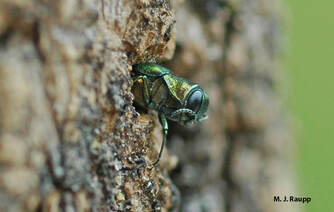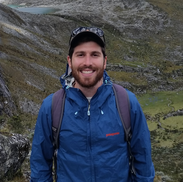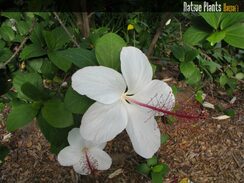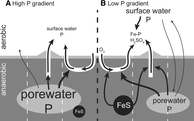 Dr. Karen Rane, Director of the Plant Diagnostic Laboratory, scheduled to talk ornamentals in the Ornamental Disease webinar series organized by Greenhouse Canada. Follow link for more details about the series including registration https://www.greenhousecanada.com/news/ornamental-disease-webinar-series-launches-32833 Written by: Maggie Hartman, Zac Lamas, Arielle Arsenault-Benoit
If you have been to the coastal tropics or subtropics, you may have seen lush trees, with almost science fiction-like root systems. These are trees in the genus Rhizophora, colloquially known as the mangroves. Mangrove forest ecosystems are coastal and found between 30° N and 30° S. They are a flowering angiosperm, with a hydrochorous propagule dispersal mechanism (dispersal occurs via water). The propagules are seedlings, formed by the embryo growing through the seed coat and fruit wall, while still attached on the mother tree, a phenomenon known as vivipary.. These propagules depend on the ocean surface current to disperse both close by and remotely; they are capable of floating in ocean currents for up to three months or more. Alternatively, mangrove gene dispersal can occur via pollen transfer by wind or insects. Ideally, these propagules are distributed to new environments where they can sprout, and mature into an adult tree. If the new tree is capable of maturing and reproducing in a new area, we would cite this as an example of gene flow. If you’re having a hard time imagining this, just think of the cosmopolitan coconut. Although technically the coconut is a drupe and not a propagule, their distribution in ocean currents is synonymous. Unfortunately for our hopeful mangroves, their propagules have to overcome barriers that restrict their distribution. Written by: Elizabeth Brandt, Mintong Nan, Anna Noreuil, Katie Reding
How it is possible to maintain a segmented body plan after loss of a key developmental gene? Dr. Alys Jarvela, a biochemist, geneticist, and postdoctoral scholar in the Pick Lab at University of Maryland, presented her research to address this precise question.  Did the polar vortex kill off some harmful and invasive insects? Professor Mike Raupp explains how cold weather impacts these invaders. Emerald Ash Borers Mike informs CBS Baltimore: “This baby has killed 100 million ash trees nationwide,” said Raupp. “Did the polar vortex kill it here in Maryland? No, it did not. It has to go to minus 23 degrees fahrenheit before we see mortality in that guy.” Read more>> Stink Bugs Mike informs WUSA9's VERIFY: "Scientists have determined the super cooling point for stink bugs. It is about 6 degrees Fahrenheit. This means that when temperatures dip below this point, lethal ice crystals form in the cells of the bugs," Raupp said. "So, yes many areas went to single digits or below and this could result in high levels of mortality..but here is the catch. This is for stink bugs in UNPROTECTED locations. The stink bugs in people's attics where temps did not hit 6 will be fine." Read More>>  Congratulations to Brian Lovett (ENTM PhD student, St. Leger Lab) for being selected to receive the American Institute of Biological Sciences’ Emerging Public Policy Leadership Award! This award recognizes the achievements of biology graduate students who have demonstrated an interest and aptitude for contributing to science and science policy. As a recipient of the award Brian will: Travel to Washington, DC to participate in the AIBS science communications training program and AIBS Congressional Visits Day Meet with lawmakers to advocate for federal investment in the biological sciences Receive a one-year membership in AIBS, which includes a subscription to the scientific journal BioScience Check out the AIBS press release here: https://www.aibs.org/public-policy/news/aibs_announces_2019_emerging_public_policy_leadership_award_winners.html Congrats Brian on receiving this award! What a wonderful and well-deserved recognition!  Written by: Katie Reding, Serhat Solmaz, and Arielle Arsenault-Benoit Adaptation to abiotic stressors and environmental change is imperative to survival in a rapidly changing world. Dr. Reid Brennan, an ecological geneticist and postdoctoral scholar in the Pespeni Lab at University of Vermont, presented his research in aquatic systems to explore the genomic basis of populations’ responses to these stressors over short- and long- time periods.  Congratulations to Dr. Magdalene Ngeve for being awarded the highly prestigious University of Maryland President’s Postdoctoral Fellowship for her postdoctoral work in Maile Neel's lab! To find out more about Magdalene Ngeve's research please visit, https://www.researchgate.net/profile/Magdalene_Ngeve Patricia L. Graham, Research Assistant Scientist and Entomology colleagues W. Ray Anderson, Elizabeth A. Brandt, JieXiang (PhD 17’, UMD MOCB, Pick Lab) and Leslie Pick, have a new paper out in Developmental Biology. Check out “Dynamic expression of Drosophila segmental cell surface-encoding genes and their pair-rule regulators” here: https://doi.org/10.1016/j.ydbio.2019.01.015
Associate Professor, Jeffrey Shultz has a review article out in ZooKeys. His paper reviews the taxonomic diversity of harvestmen in Canada. Find out how many species of harvestmen are in Canada & more in the full article, "Opiliones of Canada".
 Image Credit: David Eickhoff Image Credit: David Eickhoff UMD Scientists, Postdoctoral Research Associate Alina Avanesyan and Professor William Lamp, assessed native Hawaiian plant responses to leafhopper injury. Read findings in their recent paper titled, "Short-Term Physiological Response of a Native Hawaiian Plant, Hibiscus arnottianus, to Injury by the Exotic Leafhopper, Sophonia orientalis (Hemiptera: Cicadellidae)", published in Environmental Entomology.  Image Credit: Alan Leslie & William Lamp Image Credit: Alan Leslie & William Lamp A new study published by UMD Extension Agent, Alan Leslie ( PhD 14’, UMD ENTM) & Entomology Professor, William Lamp in the Journal of Aquatic Sciences showed that burrowing macroinvertebrates can alter dynamics of phosphorus storage and release in drainage ditches. Check out full paper, “Burrowing macroinvertebrates alter phosphorus dynamics in drainage ditch sediments” at https://doi.org/10.1007/s00027-019-0621-8  Becca Eckert, Ph.D.student (Lamp Lab), is a recipient of this year's Cosmos Scholars Grant Program. The foundation, which began in 1998, awards research grants for graduate students enrolled in Universities in the D.C. area. The Cosmos Scholars Grant Program will support Becca’s research, more specifically, experiments measuring the contribution of algae growing on leaves to stream macroinvertebrate growth. Congratulations Becca! |
Categories
All
Archives
June 2024
|
Department of Entomology
University of Maryland
4112 Plant Sciences Building
College Park, MD 20742-4454
USA
Telephone: 301.405.3911
Fax: 301.314.9290
University of Maryland
4112 Plant Sciences Building
College Park, MD 20742-4454
USA
Telephone: 301.405.3911
Fax: 301.314.9290

 RSS Feed
RSS Feed




